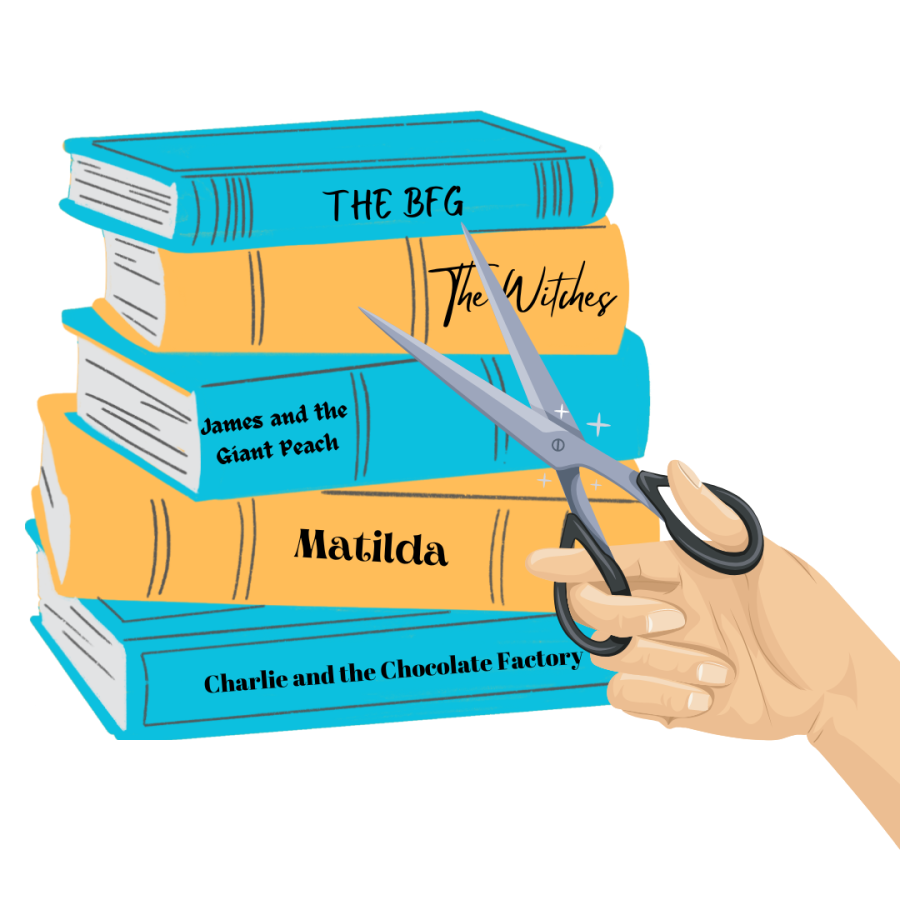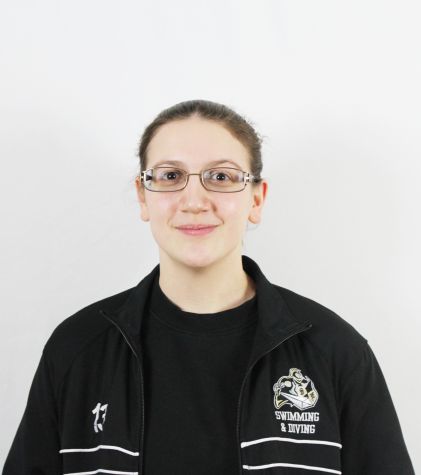Not everything needs to change with the times
The pros and cons of editing Roald Dahl children’s books
May 9, 2023
“Or maybe your largeness / is like the Tardis / considerably roomier inside,” the ensemble sings, dancing along as a boy sits in the corner of the stage, shoving fistfuls of cake into his mouth. Bruce Bogtrotter is being forced to eat an entire chocolate cake in one sitting- a punishment from his evil headmistress. However, she isn’t the only thing being scrutinized in this scene from “Matilda the Musical”. As characters tell Bruce, “You’ll never again be subject to abuse / for your immense caboose,” audiences wonder why his weight is being highlighted. Though the song is in support of Bruce, it comes close to sounding mean.
Bruce Bogtrotter is a character created by British children’s author Roald Dahl. Bogtrotter shares some qualities with another of Dahl’s characters – Augustus Gloop from “Charlie and the Chocolate Factory”. In Dahl’s books, both of these characters are overweight. In the case of Gloop, this quality is focused on in a negative way, with multiple remarks made about how “enormously fat” or “flabby” his appearance is.
Soon, however, this will no longer be the case. In February 2023, Puffin books- a publisher in the United Kingdom- announced they were re-releasing Roald Dahl books, newly edited for inclusivity. Among the revised titles were “Charlie and the Chocolate Factory”, “The Witches” and “Matilda”- the book behind the musical being performed at LSE in May.
While there are many benefits to updating a story with inclusive language, the drawbacks have sparked outrage from readers and writers.
To me, an aspiring author and fan of Dahl’s work, it doesn’t seem right for a publisher to correct a deceased author’s work, although it is common as cultural beliefs change. The Dahl edits were not the first piece of classic children’s literature to be updated, and I doubt it will be the last, but the number of changes took me by surprise.
In an article titled “Critics reject changes to Roald Dahl books as censorship”, the Associated Press (AP) spoke to Inclusive Minds, the organization Puffin and the Roald Dahl Story Company partnered with to update the books.
“Any changes were ‘small and carefully considered’,” the AP said, reporting that Inclusive Minds maintained “‘the storylines, characters, and the irreverence and sharp-edged spirit’” of Dahl’s original books.
This is largely true, although a few edits go so far as to erase qualities of a character. In “Charlie and the Chocolate Factory”, the description of Mike Teavee featured “no less than 18 toy pistols of various sizes hanging from belts around his body… [which] he would leap up into the air and fire off.” The line and illustrations depicting this have been entirely cut out, said The Independent in the article “The 6 most glaring edits to Roald Dahl’s books by publisher Puffin”.
With the regularity of gun violence in our world today, specifically incidents involving children, I understand why the publisher chose to remove that line. However, “Charlie and the Chocolate Factory” was first published in 1964, long before school shootings were a widespread issue. Mike Teavee, in my mind, exists to uphold a major theme in the novel: how problematic parenting breeds problematic children. His parents allowed him to watch violent TV every day, so he developed a fascination with weapons and violence. Erasing this aspect of his character, however minor it may seem, takes away from the story’s overall message.
In other cases, the edits have neglected to consider history. “The Witches” depicts everyday women holding jobs such as “cashier in a supermarket” or “typing letters for a businessman”.
“In the new edition, women are top scientists or business owners themselves,” said The Independent. I love stories about self-sufficient women and women in STEM, but I recognize that women haven’t always had the opportunity to hold those jobs. I don’t feel there’s anything wrong with this making its way into a children’s story from the 1980s; it was simply the way of the world at the time. Keeping the original line shows children how far our society has come, while the edit does nothing but conceal the truth.
On the other hand, some language had no place in children’s literature in the past, and still does not now. For example, a conversation about a “crazy Indian prince” was edited out of “Charlie and the Chocolate Factory”, and I am not sad to see that removed. The same goes for other offensive or outdated remarks regarding race or appearance.
However, the question becomes: Where do we stop? If we are so concerned with literature being inoffensive, should that mean we remove the n-word from “To Kill a Mockingbird”, or clean up the problematic descriptions of Black and Jewish people in “The Great Gatsby”?
Those books are still read today in middle and high schools across the United States, and no language has been changed, no matter how uncomfortable it might make readers. Rather than erasing the potentially offensive language, teachers preface these books by stating that there are descriptions in them that were considered okay at the time but were wrong back then and are wrong today. If we trust teens and pre-teens to handle such matters delicately, I don’t see why we shouldn’t offer young children the same courtesy.
LSE Media Center Specialist Sara Friest said it depends whether children get Dahl books in a classroom setting, or if they choose them on their own. Reading with teachers or parents allows for important conversations to be had and context to be provided, while if children pick up a book themselves, they won’t be “reading it with that lens.”
Students choose fiction books to “step into another world for a moment,” Friest said. “I don’t think [that] most students are wanting to analyze it that closely.”
Friest has witnessed editing controversy before. In 2020, when six Dr. Suess books fell out of print due to harmful illustrations, Friest and other LPS librarians were told to take a look at those books and choose if they wanted to keep them on the shelves. Friest pulled the books from her shelves, but kept them in her possession to show anyone who was curious about why they had been removed. She believes Dr. Seuss Enterprises “made a really great decision,” and feels the same about the Dahl edits.
“If there’s anything in a book that is unwelcoming, unfriendly to people, I feel like it’s a really good thing to update that language to make it so that everybody can still enjoy it,” Friest said. “The books that Roald Dahl wrote have such great lessons that apply to us today.”
Dahl created fantastical characters and imaginative worlds, but also became controversial for making antisemitic comments during his lifetime, which his family apologized for in 2020. This issue added another layer to the editing controversy, as many argued we should leave Dahl’s books in their original condition to serve as a lesson in intolerance for children. I think there’s something to be said for that; it is far easier to teach children to identify and confront stereotypes early in life rather than unlearn them as adults. Erasing offensive material doesn’t stop hatred or prejudice from spreading, but education does. If we use books to teach kids to respect and embrace others’ differences from the start, they could be the ones to make change as adults.
“It should be easy to train children to recognize the past’s mistakes. In the process, we can teach them that even people they love and admire are capable of grave errors,” said Washington Post reporter Megan McArdle in her opinion piece “Why it’s wrong to rewrite Roald Dahl children’s books”.
This is not the first time an author’s personal prejudice has tarnished the reputation of their work. J.K. Rowling, the beloved author behind the “Harry Potter’’ franchise, has been scrutinized in recent years for hurtful comments she made toward the transgender community.
Following Rowling’s statements, “Harry Potter” fans everywhere, including Friest and myself, found themselves at a crossroads. While an author’s personal beliefs might not directly appear in their work, it is difficult to accept that the creator of something so meaningful has been so hurtful. It’s hard to love Dahl and Rowling’s books when you don’t stand by their actions.
Still, it is okay to do so, Friest said. “If a story resonates with you, then you can still love [the] story without necessarily agreeing with all of the author’s opinions.”
She encourages students to do research into authors they love, particularly those that lived a long time ago. Looking into their lives and understanding the state of the world back then can help explain why they used insensitive language, without excusing how wrong that language is.
“I think when you put everything into perspective, then it’s easier to still enjoy the things [you] grew up with,” Friest said, adding that there is no easy answer for the dilemma of separating a creator from their creation.
I believe inclusivity in literature is important, and I wish stories like Dahl’s reflected the goal of tolerance we have today. But they don’t, and I don’t believe it’s right to edit them and pretend they do, even if the stories have valuable messages we want to continue sharing with kids. Updating language is not going to fix issues of prejudice and hatred in our world. Removing books from libraries isn’t the answer either.
“Books are like happy medicine,” Friest said, referencing a video she saw on Instagram. “So we have shelves and shelves of different prescriptions, and prescriptions can help us out, but if you take a prescription that you don’t need, it could also be harmful… you take what you need, and you leave on the shelf the things that you don’t need or that would hurt you. [But] you don’t remove books for everybody based on you because that could be somebody else’s medicine.”
She added that parents are allowed to make decisions about their own children’s reading material, but should stay away from making that decision for every child. In the end, this is what Puffin decided, choosing to keep the original versions of Dahl’s work in print alongside the updates.
For now, I think that is the best solution. If we so choose, we should be allowed to take original Dahl books with a grain of salt, recognize that they have been around for a long time and understand our beliefs as a society have changed since then. To best spread that message to children, I suggest we supplement classics like “Matilda” with other books, those that showcase stigmatized traits like body weight in a positive light, and let kids draw their own conclusions.
“Not every book is for every person and that’s okay,” Friest said. “But if it’s not for you, it’s probably there for somebody else with different life experiences, [so] let that be there for that person.”










Richard Sievers • May 22, 2023 at 8:59 AM
Great and thoughtful writing